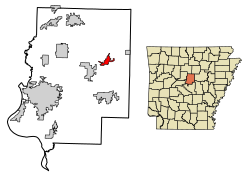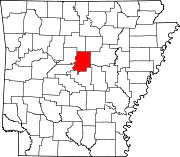Enola, Arkansas
Enola, Arkansas | |
|---|---|
 Location of Enola in Faulkner County, Arkansas. | |
| Coordinates: 35°11′37″N 92°12′14″W / 35.19361°N 92.20389°W | |
| Country | United States |
| State | Arkansas |
| County | Faulkner |
| Area | |
| • Total | 2.71 sq mi (7.03 km2) |
| • Land | 2.71 sq mi (7.03 km2) |
| • Water | 0.00 sq mi (0.00 km2) |
| Elevation | 322 ft (98 m) |
| Population (2020) | |
| • Total | 318 |
| • Density | 117.13/sq mi (45.23/km2) |
| Time zone | UTC-6 (Central (CST)) |
| • Summer (DST) | UTC-5 (CDT) |
| ZIP code | 72047 |
| Area code | 501 |
| FIPS code | 05-21820 |
| GNIS feature ID | 0076880 |
Enola is a town in Faulkner County, Arkansas, United States. It is part of the Little Rock–North Little Rock–Conway Metropolitan Statistical Area. The population was 338 at the 2010 census,[2] up from 188 at the 2000 census.
Geography
Enola is located in eastern Faulkner County at 35°11′37″N 92°12′14″W / 35.19361°N 92.20389°W (35.193741, -92.203774).[3] It is 19 miles (31 km) northeast of Conway, the county seat. Arkansas Highway 107 passes through the center of the town, leading north 18 miles (29 km) to Quitman and southwest 2.5 miles (4.0 km) to Arkansas Highway 36.
According to the United States Census Bureau, Enola has a total area of 18 square kilometres (7.0 sq mi), all land.[2]
Demographics
| Census | Pop. | Note | %± |
|---|---|---|---|
| 1970 | 173 | — | |
| 1980 | 186 | 7.5% | |
| 1990 | 179 | −3.8% | |
| 2000 | 188 | 5.0% | |
| 2010 | 338 | 79.8% | |
| 2020 | 318 | −5.9% | |
| U.S. Decennial Census[4] 2015 Estimate[5] | |||
As of the census[6] of 2010, there were 338 people, and as of 2000, 72 households, and 58 families residing in the town. The population density was 47.8/km2 (123.5/mi2). There were 79 housing units at an average density of 20.1/km2 (51.9/mi2). The racial makeup of the town was 99.47% White, 0.53% from other races. 1.06% of the population were Hispanic or Latino of any race.
There were 72 households, out of which 34.7% had children under the age of 18 living with them, 68.1% were married couples living together, 12.5% had a female householder with no husband present, and 18.1% were non-families. 16.7% of all households were made up of individuals, and 11.1% had someone living alone who was 65 years of age or older. The average household size was 2.61 and the average family size was 2.86.
In the town, the population was spread out, with 24.5% under the age of 18, 4.8% from 18 to 24, 23.9% from 25 to 44, 25.0% from 45 to 64, and 21.8% who were 65 years of age or older. The median age was 42 years. For every 100 females, there were 88.0 males. For every 100 females age 18 and over, there were 89.3 males.
The median income for a household in the town was $40,139, and the median income for a family was $41,591. Males had a median income of $32,083 versus $28,750 for females. The per capita income for the town was $20,685. About 10.9% of families and 11.8% of the population were below the poverty line, including 16.7% of those under the age of eighteen and 17.9% of those 65 or over.
Education
Public education for elementary and secondary school students is provided by the Mount Vernon–Enola School District, which leads to graduation from Mount Vernon–Enola High School. The district's elementary school is based in Enola. The district was formed by the July 1, 1991 consolidation of the Enola School District and the Mount Vernon School District.[7]
References
- ^ "2020 U.S. Gazetteer Files". United States Census Bureau. Retrieved October 29, 2021.
- ^ a b "Geographic Identifiers: 2010 Census Summary File 1 (G001): Enola town, Arkansas". American Factfinder. U.S. Census Bureau. Archived from the original on February 13, 2020. Retrieved April 18, 2016.
- ^ "US Gazetteer files: 2010, 2000, and 1990". United States Census Bureau. 2011-02-12. Retrieved 2011-04-23.
- ^ "Census of Population and Housing". Census.gov. Retrieved June 4, 2015.
- ^ "Annual Estimates of the Resident Population for Incorporated Places: April 1, 2010 to July 1, 2015". Archived from the original on October 19, 2016. Retrieved June 2, 2016.
- ^ "U.S. Census website". United States Census Bureau. Retrieved 2008-01-31.
- ^ "ConsolidationAnnex_from_1983.xls." Arkansas Department of Education. Retrieved on October 13, 2017.

